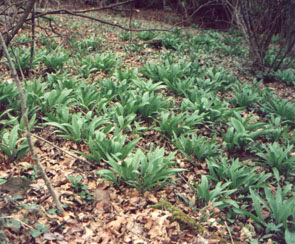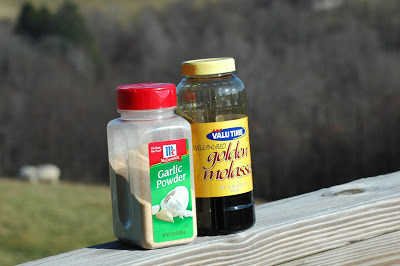 |
| Courtesy of G & N Ramp Farm |
We started day two of the conference with Forest Non-Timber; it began with a West Virginia legend, Glen Facemire, He and his wife, Noreen, run G & N Ramp Farm in Richwood, home of the Feast of the Ransom. Industrial/residential development and over-harvesting are putting our beloved ramp in some danger, so here is some of Glenn’s advice:
— better to harvest and plant than let the ramps go to seed; they have a better chance of survival
— they like to be planted near rocks
— dig the big clumps and leave the twos, threes and singles
Glen is a great speaker and very informative. We could probably do an entire post on just his class, but instead we will direct you to his book ‘Having Your Ramps and Eating Them Too’. If you can’t dig your own, or buy roadside ramps, you can buy them from Glen.
Paul Goland of Hardscrabble Enterprises was next up in the Forest Non-Timber class and gave a very educational talk and demonstration on Shitake Mushrooms. Paul is in his 80’s and is a master at what he does. Just two of his many pieces of advice – shade and temperature change are essential, and if you are having slug problems sprinkle some agricultural salt around the base of your logs. Paul does not have a web-site so if you would like contact information just let us know.
Next up, Beekeeping with Paul Poling, West Virginia’s State Apiary Specialist, presenting all the steps necessary to get started. It was very informative, as we took well over a dozen small pages of notes.
 |
| Liberty Hill Farm’s RoBeth Holstein Herd courtesy of their website |
The lunch time speaker was Beth Kennett from Libert Hill Farm in Vermont. Beth is an energetic and dynamic speaker, and shared her family’s inspirational story of running a Dairy Farm with a Bed and Breakfast. She ended her talk with a story about a young mother, her son and farmer super heroes. Suffice it to say that the Shepherdess/s and most of the room had tears in their eyes by the time she was done.
It is difficult to believe, but the class following lunch featured another great speaker, Mimi Hernandez. Mimi is the Outreach Coordinator for the Appalachian Center for Ethnobotanical Studies, and presented Medicinal Plants from the Farm and Forest Floor. She covered everything from making Chickweed Pesto to preparing a spit poultice from Plantain, the herbal bandaid. Mimi is traveling the state presenting her Mountain Roots workshops. It would be well worth the effort to hear her speak.
We rounded out the day with Brad Smith’s Small Ruminant Management. He spoke about efficient and sustainable sheep and goat production. We take every opportunity we can to attend anything about small ruminants, and always walk away with new insight, some tidbit of information or that feeling of why didn’t we think of that before. And… well,…you know…we just love to talk about sheep.
I almost ended without mentioning The Great West Virginia Pop-Off! and the Local Food Celebration & Banquet. We will save that for another day, another post devoted just to the food because that was the theme of the conference – “It’s all about the food!”


